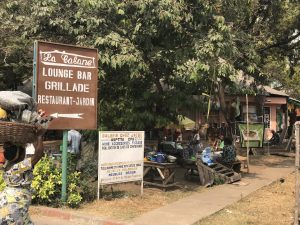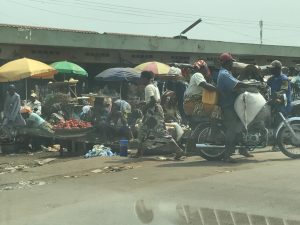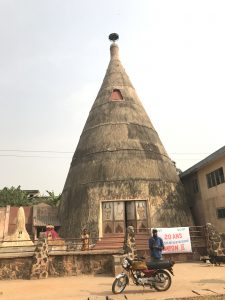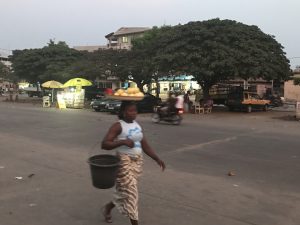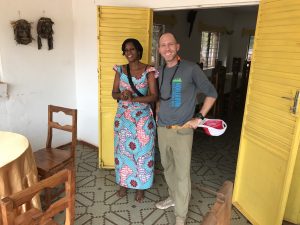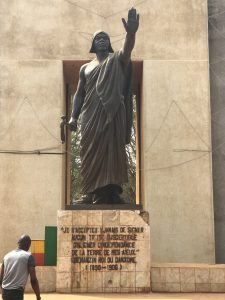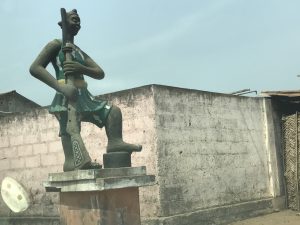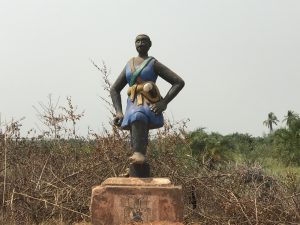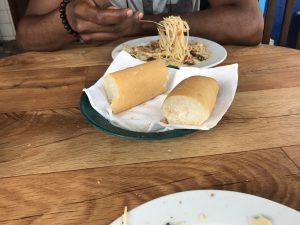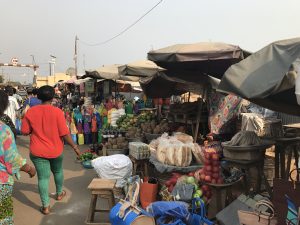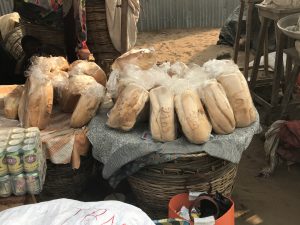Benin – Togo’s Big Brother with a Bad Attitude
Benin: Togo’s Big Brother with a Bad Attitude
Benin has rich cultural history around slave trade and voodoo
Most Meaningful Experience: Visiting the slave route at Abomey and Ouidah
• Hang out with the locals at the Cotonou Stadium, which is the place to be for good food, buses and taxis
• Make a day trip to Ouidah to see the old Portuguese Fort, Point of No Return and a voodoo ceremony.
• Drive along the old slave route from Ouidah to Abomey and visit the former royal palaces and National Museum.
• Explore the mosques and churches of Porto Novo.
• Brush up on your high-school French as people have little patience for English
• Make sure you get cash in notes less than 5000CFA, as no one can (or wants to) change 10,000 notes
My impression of Benin was tainted even before I arrived in the country. The guard at the Benin embassy in Nigeria had been abrupt when I arrived to apply for a visa before directing me to a dimly-lit room where a Samuel Jackson-esque official sat behind the desk. I knew that the visa cost $25 at the border but here he was trying to charge me 45,000CFA (around $35). But when I queried him, he just laughed at me and said “then you go to the border and they will send you back to Nigeria”.
In the end, I agreed to pay the extra to save myself the hassle, but it left a bad taste in my mouth. Particularly, when I went to the Togo embassy nearby and they kindly told me that I could get a visa at the border for $25. What a difference!
Tayo joined me on the six-hour journey in an ABC bus from Lagos to Benin, although it would only take three hours if you drove direct. We were stopped several times along the way for bag searches and document checks, and when we finally arrived at the border town of Seme, we were held up for hours.
Seme is a rundown settlement that has mushroomed around the border, extending for around a kilometer on either side. It’s a chaotic place, with lots of yelling as vehicles and pedestrians negotiate the immigration control and customs check. ABC had checked my visa before allowing me to board the bus, as they weren’t going to wait for me to get one at the border!
Two large men dressed in camouflages boarded the bus, with one singling me out and demanding from the bus conductor that he see my passport. A guy seated behind me apologized for what he called “racial profiling,” although I only saw the funny side of the whole situation.
Eventually, the bus arrived outside Cotonou Stadium and I disembarked to an immediate stream of hustlers. This is where all the action happens in the city both day and night, with street-side restaurants, market stalls and live music. I wondered why stadiums in the US didn’t invite such activity, rather than reserving them for special events.
Tayo and I jumped in a taxi to the Cotonou Guesthouse, which is situated down a sandy road lined with international embassies. Towering palms gave the area a beach-town feel (albeit without the beach) and our guesthouse was comfortable, although we found it hard to communicate with the French-speaking owners who only spoke what they referred to as “small small” English.
They did, however, introduce us to a driver who spoke some English and served as our guide for the next couple of days. After a breakfast of spaghetti, eggs and baguettes, we drove to the small town of Ouidah, which played a significant role in the trans-Atlantic slave trade. Local kings were complicit in handing over slaves to the Europeans, with many walking from Abomey (the capital of the Kingdom of Dahomey) to Ouidah where they were stuffed into ships like sardines and transported to Brazil, Portugal, France, the UK and the United States.
We visited the Ouidah Museum of History, which is housed within an 18th-century Portuguese fort, then followed in the footsteps of the slaves to the Door of No Return. Another highlight of Ouidah is the Python Temple where around 50 royal pythons are revered as the “snake-god” Dagbe. If you time your visit right, you can also watch a voodoo ceremony here or cough up $100 for a special one to be conducted.
We decided to skip the ceremony and headed instead to Abomey, a quaint town that’s dominated by an immense statue of King Behanzin who fought against the French to defend Dahomey. It’s scattered with 12 royal palaces in various states of upkeep, although slightly less lavish than those inhabited by kings and queens in the west. The National Museum offered a good insight into the lifestyle and voodoo fetishes of the Kingdom of Dahomey, with artefacts and objects once belonging to the kings.
The following day we visited the capital of Benin, Porto Novo, which is packed with churches, mosques and a few small museums. It’s here that you’ll find the Brazilian-inspired Great Mosque (which was actually built as a church) and the Musée da Silva that explores Benin’s unique Afro-Brazilian culture. If you’re interested in the tribal history of the region, then the Ethnographic Museum is the place to head, with an interesting collection of old masks, clothing and musical instruments.
For our final dinner in Benin, we headed back to the Cotonou Stadium to feast on grilled fish, maize and rice while soaking up the lively atmosphere. We couldn’t help but notice the divide between those who have and those who don’t, as well as the presence of NGOs in the country. It made me think about the relationship between handouts and commercial investment, and whether the amount of money given by charities was negatively correlated to the investment in businesses, which is what would really help the country get back on its feet.
Compared to Nigeria, we’d found people pushier and somewhat aggressive with each other in Benin. A bus driver had even told us you couldn’t get what you wanted “unless you yell for it.” There seemed to be a lack of respect between people, but with the deep and complicated history of betrayal and cruelty in Benin, these issues might take many more years to resolve.
